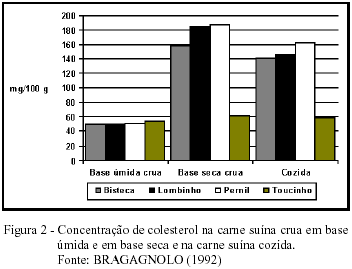Cholesterol is a complex lipid-steroid like substance mostly present in animal fat, and it has many essencial functions in living organisms. However, in humans, any metabolic problems can increase blood cholesterol concentration and, consequently, increase the risk of coronary heart disease, such as arteriosclerosis. It is a known fact that cholesterol consumption is a risk factor for people who have genetic disorders in the metabolic regulation of cholesterol. These people have plasma levels of cholesterol above 200mg/dl and a plasma concentration of high density lipoprotein (HDL) under 35mg/dl. For these people, it is important to control the cholesterol level in the diet. The consumption of pork meat as well as any kind of meat, must be monitored for the fatty acid composition the intramuscular and subcutaneous fat. Swine that received diets with high concentration of polyunsaturated fats present higher concentrations of these fatty acids in the carcass. The supplementation of swine diets with polyunsaturated fatty acids of vegetable origin cannot be above 4%, due to the detrimental effect on the conservation of the carcasses, even though it results in healthier meat for human consumption.
arteriosclerosis; cholesterol; feed; pork meat; saturated and polyunsaturated fatty acids




